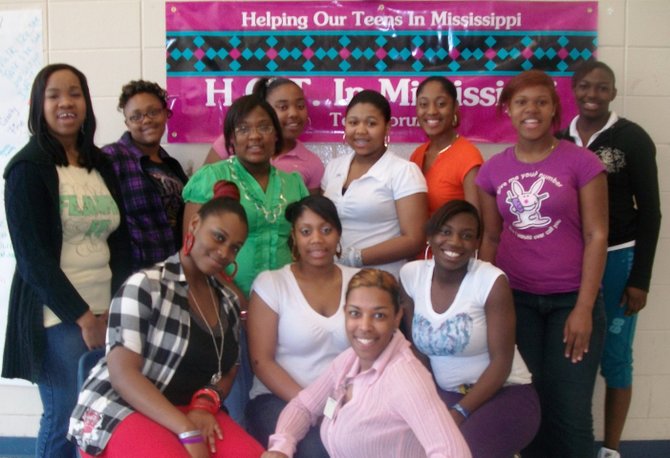The H.O.T. G.I.R.L.S. Empowerment Program is teaching teen girls how to budget and manage money. Photo by Keisha Varnell
It is vital to get food and necessities to the poor for basic day-to-day living. But to help people escape poverty, it takes the kind of programs that systemically enable people to make different and smarter decisions to change their own situation. There is room for a variety of strategies to tackle the many factors and causes of poverty; here are a few model programs that you can get involved with or borrow ideas from. Feel free to post more at jfp.ms/povertyideas.
H.O.T. G.I.R.L.S. Empowerment Program (Helping Our Teens Grow Into Responsible Leaders Successfully)
Jackson, Miss.
Keisha S. Varnell reports that a new local agency, The Family Advocacy Group, is working to educate, prevent and reduce violence in the family and community. They want to empower youth to “see beyond their circumstance to achieve their dreams and reach their full potential.”
The group is teaching budget/money management and encouraging young people to consider secondary education. Varnell describes the program:
- We offer a realistic financial literacy course to youths between ages 11 and 16 based on experiential practices in the community. We try to keep every lesson realistic as it relates to their lives.
- We are introducing young girls to “college life.” More often than not, most girls at risk of perpetuating poverty have only heard of or know of Jackson State University. We would like to show them other colleges both in and out of state—motivate them and pique their curiosity to life outside of Jackson.
Call 601-238-5034 or write kvarnell@tfagroup.org to get involved. More information is at tfagroup.org.
Foundation for the Mid South
Jackson, Miss., and beyond
Chris Crothers reports that the foundation views wealth building in challenged communities as a priority for Arkansas, Louisiana and Mississippi. It includes two main thrusts: increasing adult and youth financial competency (financial know-how as well as behavior change to actually use what is learned) and building assets (the basis of wealth).
Crothers writes: “On the asset building side, we promote tools like 1) Individual Development Accounts which provide financial education while matching low-wealth families savings for an asset, like a home or a business and 2) the Earned Income Tax Credit that helps increase low-income working tax filers’ annual income.
The foundation is releasing a brand new financial competency toolkit this week for individuals to use. They are also starting to work with teachers and school districts, because teachers are a big user of predatory lending businesses that limit their wealth-building potential.
Visit fndmidsouth.org to find out more or make a donation.
Mississippi Center for Justice
Jackson, Miss.
The Mississippi Center for Justice is based in Jackson and works to “advance racial and economic justice for hardworking Mississippians across the state.”
MCJ tackles many of the toughest factors that keep Mississippians and our neighbors in the cycle of poverty: health care, educational opportunities, affordable housing and fair lending.
Its year-end newsletter promoted successes this year that include: building a statewide coalition of businesses, churches, financial institutions and others to develop and implement alternatives to payday lending; developing a four-state program to provide free legal services to low-wealth individuals and small business owners who lost wages and income as a result of the 2010 BP oil disaster; establishing a legal services program to provide representation to homeowners in mortgage foreclosure matters as a result of the National Mortgage Foreclosure Settlement.
The MCJ says it is opening an office in Indianola to focus initially on improving the quality of the Delta’s failed public schools, expanding access to health care to the region’s poorest residents and providing access to legal representation for people living with HIV/AIDS who have faced housing, employment and privacy rights violations that keep them trapped.
Read more, donate or learn how to get involved at mscenterforjustice.org.
Education Services Foundation
Jackson, Miss., and beyond
The Education Services Foundation believes that it is necessary to get low-income young people into higher education as first-generation colleges students in order to systematically break the cycles of poverty in Mississippi and elsewhere. ESF travels the state, with a Jackson Get2College Center focused on the tri-county area, teaching students at the center and in the schools about how to apply to college and finance an education (everything is free to the community).
Mississippi’s ACT scores are the lowest in the country, and ESP also has an extensive program to address this college-going barrier. But they need to reach more people in the community. “Press and word of mouth are the best way Jacksonians can help us get the word out about our free services,” writes Tait Kellogg of ESF.
More information is at get2college.org. Write Ann Hendrick at info@get2college.org or call 601-321-5533.
More like this story
More stories by this author
- EDITOR'S NOTE: 19 Years of Love, Hope, Miss S, Dr. S and Never, Ever Giving Up
- EDITOR'S NOTE: Systemic Racism Created Jackson’s Violence; More Policing Cannot Stop It
- Rest in Peace, Ronni Mott: Your Journalism Saved Lives. This I Know.
- EDITOR'S NOTE: Rest Well, Gov. Winter. We Will Keep Your Fire Burning.
- EDITOR'S NOTE: Truth and Journalism on the Front Lines of COVID-19



Comments
Use the comment form below to begin a discussion about this content.